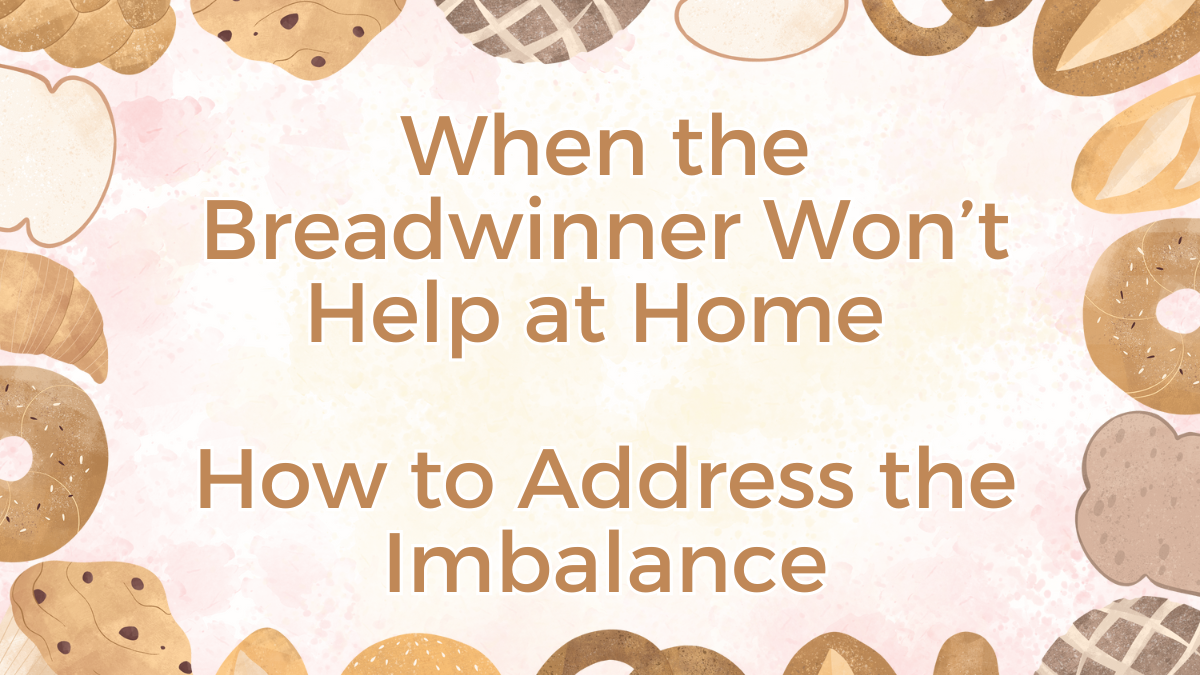
What to Do When Your Partner Says “What Do You Bring to the Table?”

The Key to Intimacy: Why Connection Comes Before Physical Touch
When one partner is the main breadwinner, it can sometimes lead to an imbalance in household responsibilities. The assumption that financial contribution alone is enough to “pay the bills” and that the other partner should bear the emotional and physical burden of running the household can be frustrating, especially if you’re the one carrying the weight of childcare, cleaning, organising, and emotional labour. If the breadwinner won’t help, it’s time for a difficult conversation.
If you’re a partner who works part-time or stays at home while your spouse refuses to contribute to the household in any other way, you’re likely feeling the strain. Not only does it leave you feeling unsupported, but it also creates a sense of inequality that can be difficult to address. So, how do you navigate a situation where one partner expects to be excused from everything except their role as a breadwinner? Here are some steps to consider:
Table of Contents
1. Acknowledge the Problem, but Don’t Shoulder the Blame
The first step is recognising that the problem lies not with your efforts but with the imbalance in how responsibilities are being distributed. You may find yourself wondering why your spouse doesn’t seem to see or appreciate the work you’re doing around the house and with the children.
Recognising the Breadwinner and Household Responsibility Imbalance
Start by acknowledging that both roles—breadwinner and home manager—are important and demanding in their own ways. Financial support is essential, but so is maintaining a home, caring for children, and managing all the behind-the-scenes emotional and logistical tasks that keep a family functioning.
Remember, your work is valuable too—this isn’t just about housework; it’s about the time and emotional energy you’re investing to maintain the family unit.
2. Open the Dialogue About Unequal Household Labour with Empathy
It can be hard to approach your spouse about their refusal to share in the household and emotional labour, especially if they seem set in their views. But starting a conversation from a place of understanding can make a huge difference. Rather than accusing them of doing nothing, try framing it in a way that highlights the strain you’re experiencing.
For example:
“I know your job is demanding, and I really appreciate everything you do for our family. But I’ve been feeling overwhelmed with the load here at home—caring for the kids, managing schedules, doing the cleaning, and handling everything in between. It’s taking a toll on me, and I need us to talk about how we can balance things out.”
Be specific about how you’re feeling—whether it’s exhaustion, resentment, or frustration—so your spouse can understand the emotional burden you’re carrying. The goal is not to accuse them, but to have a productive conversation about finding balance and acknowledging each other’s roles.
3. Setting Boundaries When Your Partner Won’t Share the Load
If the discussion doesn’t seem to make an impact, it may be time to set clearer expectations. Often, a refusal to participate in household labour can stem from a lack of awareness or an ingrained belief that the other partner “signed up” for all that work. Set boundaries around what you can reasonably manage and explain why it’s essential that your partner steps up.
Consider saying something like:
“I’m happy to support the family in the way I can, but I can’t do it all. I need help with [specific tasks] to make sure everything runs smoothly and that we both feel supported. It’s important that we work together to maintain the balance of responsibilities.”
If the responsibilities continue to fall unfairly on your shoulders, it may be necessary to reconsider how the work is divided. Both of you have responsibilities, and it’s okay to ask for shared contributions that make the home life more manageable.
4. Address the Emotional Labour
Emotional labour is often the most overlooked part of household work. This includes everything from remembering family birthdays to managing the children’s emotional needs, addressing relationship dynamics, planning vacations, and handling crises. It’s mental work that can be just as draining as physical chores, yet it’s often invisible and expected to be handled by the non-breadwinning partner.
Addressing emotional labour requires a direct conversation about the mental toll it takes. Let your spouse know that you’re not just physically cleaning, but you’re also shouldering the emotional weight of making sure everyone feels cared for, including them. You might say:
“I’m not just cleaning and cooking—I’m also managing the emotional needs of the kids and dealing with all the planning and problem-solving that keeps the household running. This can’t all fall on me, and it’s important that we work as a team.”
Emotional Labor: The Invisible Work Shaping Our Lives and How to Claim Our Power
5. Propose a Plan for Equal Contribution
If your spouse continues to refuse to contribute or downplay the importance of household work, it may be necessary to propose a concrete plan for how things can be more fairly divided. This doesn’t mean asking for an equal split, but rather ensuring that both partners are contributing in ways that align with their skills and available time.
Perhaps it looks like:
- Your spouse taking over specific tasks like grocery shopping or cooking dinner on certain days.
- Taking responsibility for bedtime routines or weekend activities with the kids.
- Both of you setting aside time in the evening for relaxation, after equally contributing to the home.
The goal is to share responsibilities that honour both the need for work-life balance and the reality of a household that requires constant upkeep. Be firm about what’s non-negotiable, but also open to finding solutions that work for both of you.
Why Being an Organised Mum Can Make Your Life Easier
6. Evaluate the Dynamics of the Relationship
If, after multiple conversations, your spouse still refuses to engage in any way, it might be time to evaluate the overall dynamics of the relationship. While it’s natural to expect some imbalances, a refusal to contribute to household labour or recognise the value of your work could be a sign of deeper issues, such as a lack of respect or understanding.
It’s essential to consider whether the relationship is truly equitable and whether both partners are willing to meet each other’s needs. If the imbalance persists, it might be helpful to seek professional counselling or relationship therapy to address the issue and work through underlying concerns.
7. Prioritise Your Wellbeing
Finally, while you’re advocating for change, don’t forget to prioritise your wellbeing. Household responsibilities and emotional labour can quickly lead to burnout, so make sure you’re taking care of yourself along the way. This might mean setting aside time for hobbies, seeking support from friends or family, or exploring self-care routines that help you recharge.
In the end, a relationship is a partnership where both parties contribute in meaningful ways—whether through finances, household work, emotional support, or childcare. It’s not about being perfect; it’s about showing up for each other and ensuring that the load is shared.
When one person refuses to contribute, it’s not just a household problem—it’s a relationship problem. By addressing the imbalance and setting clear boundaries, you can create a healthier, more respectful partnership moving forward.
The High-Conflict Couple: A Dialectical Behaviour Therapy Guide to Finding Peace, Intimacy & Validation

I am a preschool and primary school teacher and mum to 3 children. I have been involved in education since 1997 and have trained in a variety of educational specialist areas. It is with this expertise that I write articles to help parents and educators provide quality learning experiences for the children in their care.





